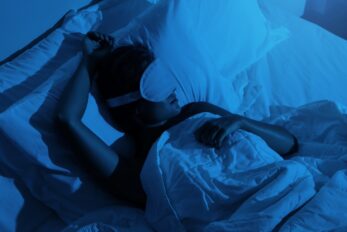The countdown is on: Tomorrow marks not only a new year, but a new decade. If you’re setting goals to eat healthier, workout and lose weight you’re not alone: According to The Personality and Social Psychology Bulletin, roughly 55% of New Year’s Resolutions are health related. And while we’ll cheerlead you all the way to the gym and that triple-digit monthly membership, there are other (read: cheaper) things you can do to crush your health goals in 2020. It’s called sleep. And this is why you need more of it:
- Sleep helps you workout harder
Ever heard of PBs? They’re your “personal bests,” and we want to help you crush them in 2020. The thing is: When you aren’t well-rested pre-workout, you can’t push yourself as hard because your body is tired and you perceive the workout to be harder than it is. You’ll think you’ve hit your max before you actually have (and if you know anything about gym gains, your max is where the magic happens). A good night’s sleep will not only help you wake up for an early-bird sweat sesh, it’ll help you push your limits and reach your goals.
- Sleep supports muscle recovery (and prevents injury)
When you lift weights, you create micro-tears in your muscle, which you know as that familiar post-workout soreness. When those tears heal, you get stronger. So, in between sweat sessions, you want to count on your body to heal itself, and fast—and sleep is essential to muscle repair. While we’re snoozing, the pituitary gland in our brains release human growth hormone to help repair and build lean muscle. So, bring on the post-workout sleep!
- Sleep helps you burn more fat
You may think the longer you’re awake, the more calories you’ll burn. While we get your logic, the opposite is actually true: Your body’s most efficient fat-burning happens when you’re asleep. Why? Two words: Insulin and cortisol. Insulin regulates the amount of sugar in our blood and ultimately helps us tap into fat stores for energy; but when we’re getting less than seven hours of sleep a night, our bodies can become insulin resistant, which makes it difficult to tap into those fat stores. In fact, a study by the University of Chicago showed that sleep deprivation begins to reduce your insulin sensitivity by more than 30% after only four days. Likewise, sleep deprivation stimulates cortisol production. Cortisol is one of our stress hormones, and when it’s chronically high it leads to—surprise, surprise—weight gain.
If optimizing your hormones isn’t convincing enough, a research conducted by the Annals of Internal Medicine showed that insufficient sleep can actually counteract that picture-perfect diet of yours. In one study, two groups followed the same diet, but were assigned different sleep schedules. The result? Those who were assigned enough sleep not only lost more weight, but half of what they lost was from fat stores. And the sleep-deprived group? Even though they were following the same diet, they reported being hungrier. They were less satisfied after their meals and had less energy for exercise. On that note…
- Sleep regulates your hunger
Sleep supports more hormones than just insulin and cortisol: It impacts leptin and ghrelin, too. These hunger hormones are responsible for telling you when you’re hungry (ghrelin) and when you’re full (leptin). But when you’re short on sleep, your body can’t regulate these hormones efficiently, so you’ll find yourself feeling hungry when your body doesn’t actually need food and never feeling satisfied after a meal—not a pretty combination.
Plus, when we’re sleep deprived, our brain is hard-wired to cave into cravings: The frontal lobe (which controls decision-making) is impaired, while the amygdala (the “reward centre” of the brain) is on overdrive. The results? We’re driven by desire (like that pint of Ben & Jerry’s) and can’t control our decisions. Not a winning combination for weight loss!
In short, you should think of sleep like you would warming up and cooling down from your workout: Essential. The effects it has on our bodies aren’t as obvious to the naked eye, but they can wreak havoc on your health goals, just the same. So, if you’re setting your health goals for 2020, make sure sleep is at the top of your to-do list.
We can help you crush your sleep goals, starting with a free at-home sleep study. Book online, or call a Sleep Therapeutics clinic near you.






